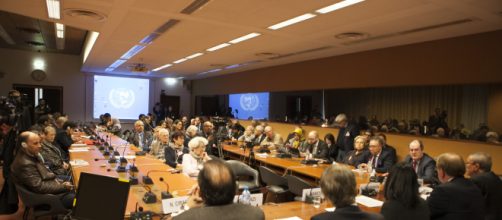In iran, the recent round of 2017/2018 protests has brought fresh scrutiny to the Iranian regime, which claims to be in control of their country. Yet the protests demonstrate that there are cracks and the Iranian people are vocalising their dissatisfaction with the mullahs and the Iran government.
During the current session of the UN Human Rights Council, a meeting on the human rights situation was held, focusing in the aftermath of the popular uprising that began in 2017. The meeting was hosted by France Libertés, Mouvement Contre le racisme et pour l’amitié entre les peuples (MRAP), the Women’s Human Rights International Association (WHRIA), and the International Educational Development (IED).
The various panellists included individuals who have continued to speak out regarding the human rights situation within Iran, particularly the efforts of the regime to quiet any opinions or potential gatherings that the mullahs see as a threat to their power.
The role of the PMOI/MEK in recent uprising in Iran
One of the points made at the meeting is that the regime is concerned about the continuing role of People's Mojahedin Organisation of Iran or the Mojahedin-e Khalq - PMOI/MEK in Iran, despite efforts to stamp out this opposition group, which is the main group in the coalition of Iranian opposition groups, known at the National Council of Resistance of Iran (NCRI). The PMOI/MEK have pointed out that there is no reforming the regime and that the only hope for Iran is regime change.
In the introductory comments of the meeting, it was pointed out that 90% of the executions in the Middle East happen in Iran.
The response from the regime against the protestors included arrests, the use of malware to track those who participated in the protests, sending in the Islamic Revolutionary Guard Corps (IRGC) to gun down protesters in the streets, and of those arrested, 16 have died in custody.
“The EU must understand the true nature of the so-called justice system in Iran, where the current Justice Minister Ali Reza Avaei has been listed on EU and UK terrorist lists since 2011,” said Struan Stevenson, Member of the European Parliament (1999-2014) and Coordinator for the campaign for a change in Iran.
He called on the United Nations and the international community to hold Iran responsible for its actions against the Iranian people, especially in regard to the 1988 massacre of political prisoners and to demand the release of those arrested in the recent protests.
“The human rights situation in Iran has deteriorated dramatically over the past few months,” said Giulio Terzi, former Italian Foreign Minister. He then went on to quote statistics of how many individuals were arrested as part of the recent protests and the injuries and killings that resulted as the regime attempted to impose its will upon the Iranian people, many of whom are dealing with poverty while the regime spends billions on its military endeavours throughout the Middle East.
Terzi noted that killing prisoners through torture and then claiming that they committed suicide has become a regular practice of the regime.
All of the speakers called on the international community to investigate the 1988 massacre, but also to hold Iran accountable for its actions, and not believe that the regime can be “moderate”.
Speakers
Other speakers at the event included Taher Boumedra, former Chief of the Human Rights Section of the United Nations Assistance Mission in Iraq (UNAMI); Gerry Horkan, member of the Irish Senate; Nicola Ciraci, member of the Italian Parliament; Parviz Khazai, former Ambassador, member of the International Association of Jurists (Norway), and NCRI Representative in Scandinavia; and Simin Nouri, President of the Iranian Women’s Association in France. The meeting was moderated by Hanifeh Khayyeri.


